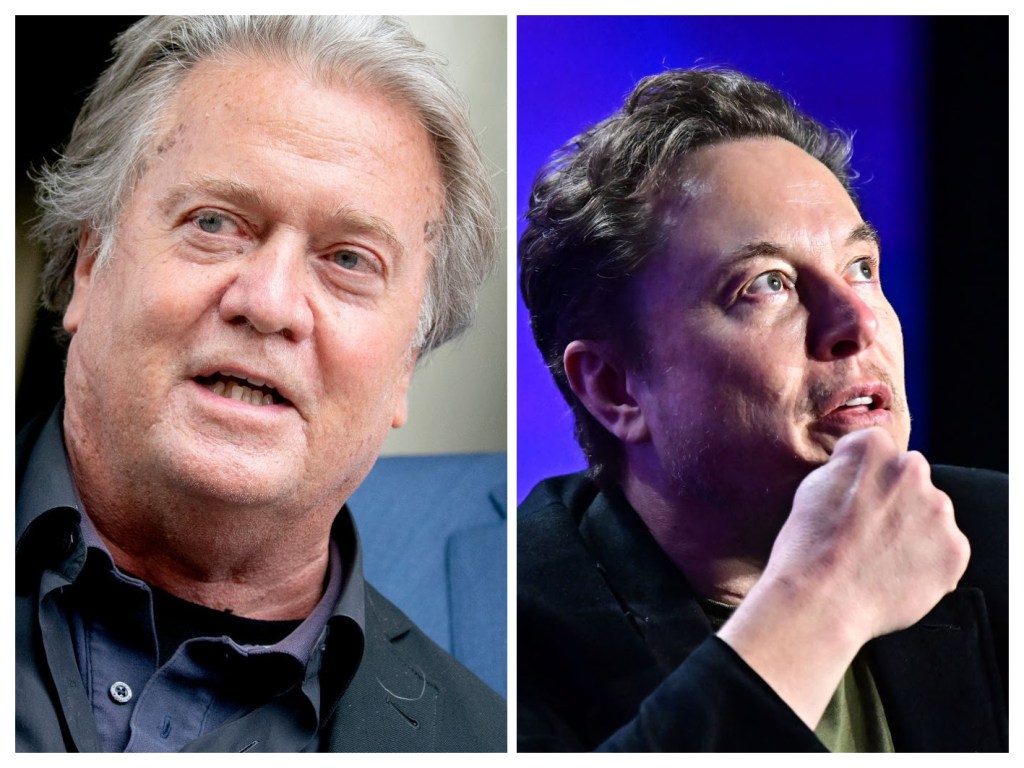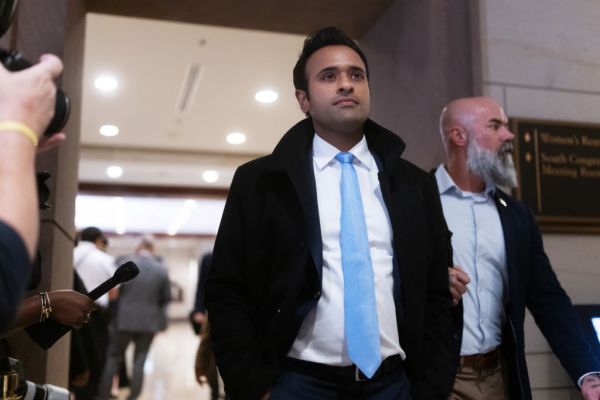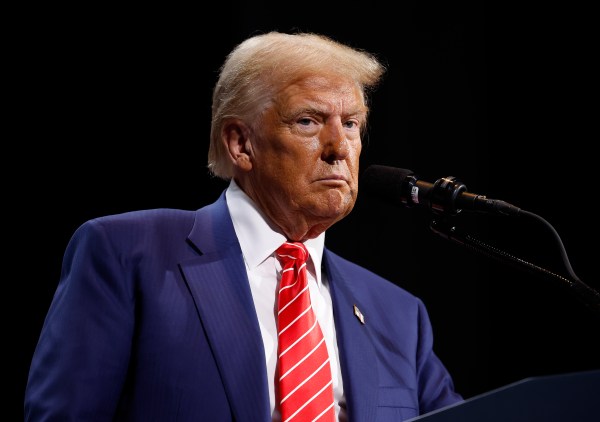Demagogues require scapegoats, and it’s hard to find scapegoats in the government when you, er, control the government.
That’s how Kevin Williamson explains Donald Trump’s curious interest in annexing Greenland in a column elsewhere on the site today. “You cannot very well have your ‘unitary executive’ and blame somebody else for the shenanigans of the bureaucrats who work for you,” he writes. “So the psychological locus of conflict must be shifted to foreign adversaries”—weak foreign adversaries, specifically, so that the demagogue-in-chief doesn’t risk blustering his way into a hot war. Hence: Greenland.
Makes sense. Logically, populists should struggle to identify domestic enemies among the ruling class now that they are the ruling class. But two facts give me pause.
One is that blame-shifting is Trump’s greatest talent. When, not if, his administration fails to accomplish some of its domestic goals—and the bar for success has already fallen lower than his lawyer Alina Habba’s taste in men—-someone will need to take responsibility. It sure ain’t gonna be him.
The other is that Trump’s movement is a movement of Jacobins and Jacobins always end up guillotining each other. One could turn Kevin’s logic around, in fact: Because the demagogues of the American right are now in charge of everything, the stresses of having to govern and to choose among conflicting right-wing priorities are destined to set them at each other’s throats. Their dopey imperialist fantasy about seizing Greenland might have been a fleeting moment of unity to briefly delay the dropping of the blade.
Look no further than MAGA mega-toady Steve Bannon declaring war on MAGA mega-toady Elon Musk.
Bannon has had a bee in his bonnet about Musk for the better part of a month, ever since Elon went to the mat in support of H-1B visas for highly skilled immigrants. “He is a truly evil guy, a very bad guy. I made it my personal thing to take this guy down,” he told an Italian newspaper recently, vowing to have Musk “run out of here by Inauguration Day.” Turning to Silicon Valley’s habit of hiring migrants instead of Americans, Bannon took the gloves off—and sounded a little, well, woke in the process:
“No blacks or Hispanics have any of these jobs or any access to these jobs,” Bannon said.
“Peter Thiel, David Sachs, Elon Musk, are all white South Africans,” Bannon observed. “He should go back to South Africa. Why do we have South Africans, the most racist people on earth, white South Africans, we have them making any comments at all on what goes on in the United States?”
Well then.
Pity poor Elon, who spent Christmas week defending Indian engineers from Groypers calling them sewage-drinking subhumans only to have Groyper-adjacent nationalist Steve Bannon turn around and accuse him of being racist. The rift over immigration policy developing between red-pilled tech bros, color-blind nativist ideologues, and gutter white supremacists will be a fun one to follow over the next four years.
But it won’t be the only one. There are numerous rifts opening on the right as Donald Trump prepares to take office. The GOP caught the proverbial car on Election Day and now each of its factions wants to drive; watching them tear each other apart will be one of the small silver linings of a second Trump presidency.
Which brings us to J.D. Vance.
Politics as usual?
If you think a Mexican standoff between Musk, Bannon, and the chud right regarding precisely how racist toward immigrants one should feel is absurd (apologies to the last group for comparing them to Mexicans), consider the pickle in which the vice president-elect finds himself.
Vance was asked on Fox News Sunday about Trump’s plans to grant clemency to people convicted of crimes committed during the insurrection four years ago. “I think it’s very simple,” he replied. “Look, if you protested peacefully on January 6 and you had Merrick Garland’s Department of Justice treat you like a gang member, you should be pardoned. If you committed violence on that day, obviously you shouldn’t be pardoned. And there’s a little bit of a gray area there.”
He’s right that it’s simple, just not in the way he suggests.
No one should be pardoned. The goons who threw punches at the police shouldn’t, obviously. Neither should the nonviolent trespassers who were inside the Capitol that day to prevent Congress from transferring power to the lawfully elected president, not because they got lost on a tour or whatever. The worst offenders never entered the building, in fact: Seditionist masterminds like Stewart Rhodes and Enrique Tarrio organized the mayhem but didn’t venture into the Capitol themselves.
It’s par for the course that Vance would deceive viewers by implying that some convicts were imprisoned for nothing worse than “protesting peacefully,” but give J.D. his due. At least he’s willing to concede that violent offenders are unworthy of mercy.
Many populists aren’t. “Telling your own supporters that the election was stolen and then not giving them a pardon or commutation after you sent them into what you call a ‘fedsurrection’ and ‘trap’ is a betrayal,” one insurrectionist complained afterward. “All of the J6 defendants must be saved.” The backlash online to Vance’s interview grew quickly enough that within a few hours he was forced to do damage control by reminding MAGA fans that he sympathized with the coup’s shock troops before sympathizing with the coup’s shock troops was cool.
In short, a rift has developed between the soon-to-be vice president and his own party’s base over whether cop-beaters deserve to waltz out of prison scot-free. How’s that for an entertaining bit of Jacobin-on-Jacobin bloodletting?
“This is all politics as usual,” you might say, and in a narrow sense you’d be right. New administrations are always torn between moving their agenda aggressively to satisfy their base and tempering the excesses of that agenda to satisfy swing voters who made the difference for them on Election Day. Vance has surely seen the polling on pardoning January 6 convicts; the best he can do to appease MAGA without alienating middle America is offering clemency to the least objectionable insurrectionists while withholding it from the most objectionable.
Ditto for highly skilled immigration. There’s a reason Trump has sided with Musk against Bannon in that debate and it has less to do with what Elon did for him financially during the campaign, I think, than with how broad majorities of Americans feel about the matter. The incoming president doesn’t want to tank his popularity right out of the chute so he’s siding with the center against the right. That’s what happens when the out-party catches the car, takes over the government, and suddenly has to consider the priorities of moderates.
It’s politics as usual … except Trump’s movement isn’t really politics as usual, is it? Certainly not in the way that, say, Joe Biden’s winning coalition in 2020 was.
MAGA is a revolution. And so its rifts will be unusually fraught, bitter, and high-stakes.
Revolutionary war.
Before Trump came along, the closest thing in my lifetime to a revolutionary movement in American politics was the coalition Ronald Reagan built in 1980. But Reagan conservatism was well within America’s liberal tradition, with the Gipper himself once naming libertarianism as the “very heart and soul” of his philosophy.
Trump’s movement is postliberal, a true departure. Few of its supporters call themselves authoritarians but there aren’t many conflicts between their hero’s desires and the Constitution, I suspect, in which they’d side with the latter against the former. They’ve spent 10 years subduing and ultimately purging remnants of classical liberalism on the right and have twice seen their insurgency rewarded with the presidency, most recently with a plurality of the popular vote.
That’s a real revolution and its success is a crucial difference between the right’s postliberals and the left’s. Progressives tried to seize control of their own party over the same 10-year period and failed miserably, twice losing presidential primaries to mediocre establishment Democrats. In the process, they took cultural stances that offended swing voters so dependably that their party’s leadership class currently can’t run fast enough in the opposite direction.
Rifts are constantly opening between liberals and progressives over policy but there’s no doubt that the more centrist faction of the two is in charge. And because there isn’t, leftists are more likely to bow to centrists’ wishes in governing. For all their bluster, for instance, the socialist faction of House Democrats led by Alexandria Ocasio-Cortez provided reliable votes to advance Democratic legislation when the party last held the House. That’s politics as usual: The less popular radical faction cooperates with the more popular mainstream one to get what it can.
MAGA isn’t politics as usual. The radical faction, not the “mainstream” one, is dominant, which explains why Speaker Mike Johnson has a lot more trouble wrangling his populists than Speaker Nancy Pelosi had. And because it’s dominant, the rifts among its members aren’t only or even primarily about setting policy. They’re about control of an ascendant revolutionary movement.
That’s what has Bannon so spooked about Musk, of course. It’s not a matter of precisely how many H-1B visas America should issue, it’s a matter of a postliberal revolution suddenly being steered by its plutocratic wing in a more liberal pro-immigration (or, ugh, “globalist”) direction against the wishes of its old-school populist wing. Unlike AOC and the far left, who have never been in charge, Bannon fears having a victorious revolution “stolen” right out from under him. Those stakes are an order of magnitude higher than the usual center-versus-left policy squabble.
Vance faces the same problem in pardoning January 6ers. From the standpoint of “politics as usual,” it’s insane beyond words that the party that will be in charge of the U.S. government a week from now is debating whether its most violent seditionists should be freed—and J.D., the heir apparent to Trump, knows it. If he’s going to win the presidency in 2028, he won’t be able to rely on celebrity like his boss does to paper over his radicalism; he’ll need to build credibility with centrist voters, which will require him to pick his spots on policy. “Don’t pardon cop-beaters” is a nice place to start.
From the standpoint of revolutionary politics, though, the base’s demand for blanket pardons for the J6ers makes sense. Successful revolutions routinely empty the prisons of the ancien régime upon seizing power without regard for who’s violent and who isn’t, don’t they? To MAGA fans, Vance’s reluctance to follow that revolutionary ethic must feel like an ominous sign that the new administration won’t govern as radically as they had hoped. As with Bannon and Musk, they might fear that their revolution is being usurped and co-opted by a latecoming opportunist who views Trumpism chiefly as a vehicle for his own ambitions and who doesn’t sincerely believe that the cause of the glorious revolutionary heroes on January 6 was just. Again, those stakes are much higher than they are for mundane policy disputes.
Politics as usual can handle arguments over what the government should or shouldn’t do about a particular issue, as that’s what democracy is set up to do. But once the direction of a triumphant revolution is at stake, with Montagnards and Girondins eyeing each other suspiciously, that’s when the guillotine comes out.
Rifts to come.
Not all policy disputes to come on the right will implicate the direction of Trump’s movement, and so not all disputes risk bitter rifts within the GOP.
There will be bickering galore among Republicans in Congress over the tax package that’s coming this year, for instance, but I doubt the bitterness will leach out into the populist rank-and-file. MAGA’s revolutionary politics are cultural, not fiscal, no doubt to the dismay of full-spectrum populists like Bannon, and so a huge giveaway to Elon Musk’s plutocratic class in the form of new tax breaks probably won’t have any Trump fans reaching for pitchforks. Even shafting working-class families by not expanding the child tax credit will likely pass without much backlash.
But on cultural disputes, where the glory of the revolution is at stake? Hoo boy. The crowd that wants to prioritize deporting criminals and the crowd that wants to prioritize deporting, ah, everyone will be sworn enemies before very long, I’m sure. The same goes for America First-ers who want to go all-in on containing China and America First-ers who can’t understand why we’d fight a war on the other side of the world instead of practicing a little national-greatness imperialism on the cheap closer to home by seizing Greenland.
It’s hard to predict which side will “win” those arguments. But it’s easy to predict whom the losers will blame: not Trump.
That’s another thing that distinguishes successful right-wing postliberal revolutionaries from unsuccessful left-wing ones. Ask a disgruntled progressive about the failures of Joe Biden, a leader to whom he feels no strong ideological allegiance, and he’ll talk your ear off about the president’s betrayals. Ask a disgruntled populist about the failures of Donald Trump, the hero of the revolution, and he’ll talk your ear off about how the president has been betrayed by his aides. Bannon’s venom toward Musk is a transparent case of scapegoating a lesser MAGA figure for a policy that Trump himself has endorsed.
The same will be true next week if and when Trump declines to pardon violent January 6 insurrectionists. Now that Vance has made himself the face of that policy, he’ll be scapegoated by right-wing populists for the outcome even though the decision is plainly Trump’s alone. That’s a bad spot for the heir apparent ahead of 2028 but one in which he’ll likely find himself repeatedly over the next four years: Now that they’ve caught the car, Trumpists will need people to blame if the administration ends up disappointing them. The deputies advising their leader in the West Wing are obvious targets of opportunity, and the vice president is the most obvious among them.
Good luck to J.D., would-be ruler of the Leopards Eating People’s Faces Party, on not having his own face eaten. He’ll need it.










Please note that we at The Dispatch hold ourselves, our work, and our commenters to a higher standard than other places on the internet. We welcome comments that foster genuine debate or discussion—including comments critical of us or our work—but responses that include ad hominem attacks on fellow Dispatch members or are intended to stoke fear and anger may be moderated.
With your membership, you only have the ability to comment on The Morning Dispatch articles. Consider upgrading to join the conversation everywhere.